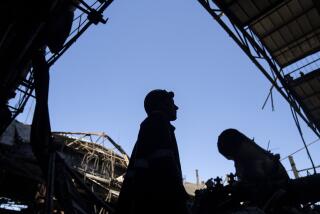9 Years Later, Chernobyl Disaster Looks Worse : Aftermath: Ukrainian official estimates that 125,000 have died as a result of nuclear accident.
- Share via
MOSCOW — Nine years after the world’s worst nuclear accident, scientists marked the grim anniversary Wednesday by disclosing that their gravest fears about radiation risks have become reality.
When an explosion at the Chernobyl nuclear power station sent a radioactive cloud across Ukraine, Russia and much of Europe on April 26, 1986, the disaster turned those nations into laboratories and the populations into guinea pigs.
Ukrainian Health Minister Andrei Serdyuk disclosed on the eve of the anniversary the latest, most disturbing estimate of Chernobyl’s death toll--125,000, with a disproportionate share of casualties among children, pregnant women and rescue workers who responded to the disaster.
The Kiev government blamed the accident for a nearly 16% rise in the death rate in northern Ukraine and said the incidence of thyroid and organ cancers has soared.
“Scholars have confirmed the theories about a danger of influence from small radiation doses on the human organism, which is no less severe than from one-time massive doses,” Russia’s quasi-official Itar-Tass news agency reported.
Vyacheslav Grishin, chairman of the Russian Chernobyl League, which unites many of the estimated 300,000 Russian citizens involved in the accident or the massive cleanup effort that followed, warned that the worst of the accident’s consequences may be yet to come.
“Doctors expect the peak of oncological diseases (cancers) in those people (exposed to radiation) in the second decade after the disaster,” Grishin told Moscow journalists after a memorial ceremony at Mitino cemetery, where the first 27 victims of the Chernobyl disaster were buried in lead coffins in 1986.
More than 140,000 people have had to abandon homes rendered uninhabitable by radiation, and half a million more continue to live amid the contamination. Ukrainian and Russian reports on the aftermath of the accident estimate that half of Ukraine’s territory was damaged by the huge radiation release.
Despite the daunting statistics, debate continues over when and whether the three remaining reactors at Chernobyl should be shut down.
Ukrainian President Leonid D. Kuchma agreed under pressure from the world’s most powerful nations to close the Chernobyl complex by the year 2000 but on condition that the governments of the European Union and the Group of Seven industrialized countries foot the bill.
Kiev has estimated it will need $4 billion to finance a gas-burning power station to replace Chernobyl’s output, to retire the plant’s 5,000 employees and for repairs to the concrete “sarcophagus” entombing the exploded reactor. Ninety percent of the reactor’s nuclear fuel remains sealed in the container that was supposed to last for 30 years but is already showing signs of cracking.
“The Chernobyl problem is a comprehensive one, and we hope for better international cooperation and the merging of intellectual and material resources of the international community in order to overcome the catastrophe’s aftermath,” said an appeal issued by the Ukrainian Parliament.
The plea stressed that Ukrainians should not be left to deal with the costly consequences on their own. It said 5% of the national budget is already devoted to Chernobyl cleanup and that several times that amount is needed to do a proper job.
While officials press the case for assistance or a more gradual pace of replacement of the Chernobyl complex, environmental groups and relatives of disaster victims used the anniversary to call for an unconditional shutdown.
Greenpeace demonstrators joined a rally in central Kiev on the anniversary, unfurling a banner in Independence Square reading: “Remember Chernobyl.” A group calling itself the Socio-Ecological Union against Nuclear Power also picketed the Atomic Energy Ministry in Moscow, appealing for broader use of solar, wind and water power instead of atomic reactors.
More to Read
Sign up for Essential California
The most important California stories and recommendations in your inbox every morning.
You may occasionally receive promotional content from the Los Angeles Times.














